#craniometer
Explore tagged Tumblr posts
Text
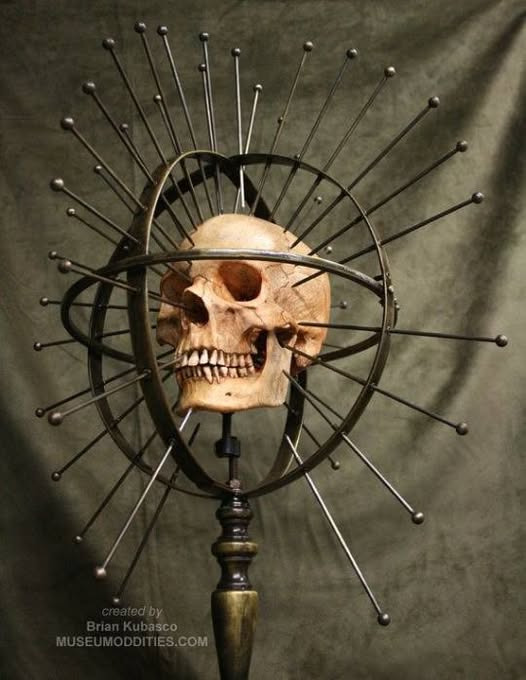
Craniometer. This instrument was used for measuring the external dimensions of skulls for comparative studies. Craniometry was also used in phrenology, which appeared to determine character, personality traits, and criminality on the basis of the shape of the head.
Appeared to only, because we now know that phrenology was a bunch of malarkey.
7 notes
·
View notes
Text
Visiting Physician: Excuse me, you say you divined this psychically?
Merlin: That's right.
Visiting Physician: Fascinating. If you should pass away, I would love to dissect your temporal lobe.
Merlin: Sure. I can't possibly see why not, but I'm hoping you get us all through this thing alive.
Visiting Physician: Yes, in that case, I would love to get my hands on a sample of your DNA.
Merlin: Weird. Uncomfortable. Consider it done.
Arthur: You know, I'm actually the brains of this operation so you might wanna get mine.
Visiting Physician: I could care less about your secretions. However, I would love to get my craniometer around that giant Raisinette of yours or is it a Goober? Possibly a Milk Ball.
Merlin: I'd say Milk Ball. It's Milk Ball.
#bbc merlin#merlin incorrect quotes#incorrect merlin quotes#incorrect quotes#the adventures of merlin#merlin#merlin emrys#merlin bbc#arthur pendragon#king arthur#merlin x arthur#arthur x merlin#bbc arthur pendragon#bbc arthur#incorrect merthur quotes#bbc merthur#merthur#psych tv#psych
24 notes
·
View notes
Note
Please send me your cranial measurements. I would love to study them for science.

THIS STRANGE MAN AGAIN. the priest barely frowns, hands resting idly at her side. all the good doctor would receive was a small narrowing of the eyes and sideways glance. perhaps, if she ignored him enough, he would leave. not like the craniometer would have fit over her pins, anyway.
* UNPROMPTED ( accepting. ) —
#i truly believe pinhead would find birkin so deeply and inherently annoying it would make her cry if she felt emotions like a human being#she sees him like this -> 🤓☝️#— ic. *#gviral
3 notes
·
View notes
Text
The disease outbreak episode in S4 guest-starring Judd Nelson is also heinous. The Judd Nelson doctor literally looks at Gus and says to him that "I would love to get my craniometer around that raisinet of yours." You have a White doctor telling a Black man that he would love to measure this Black man's head, and it's meant to be seen as funny:

Finished Psych season 1 and while I like the show so far, I'm often this 👌🏻 close to punting Shawn for the way he treats Gus.
48 notes
·
View notes
Photo

Craniometer -an instrument for measuring the human cranium or skull $1,200.00 briankubasco
1 note
·
View note
Text
Sokka vs. Wan Shi Tong
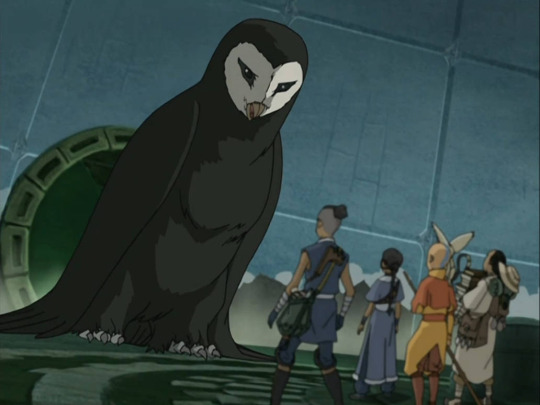
Was listening to the latest episode of the “Braving the Elements” Podcast about “the Library” episode (which starts off with a solid discussion about Asian representation and appropriation in Hollywood). They started discussing the groups’ contributions of knowledge to Wan Shi Tong. They discussed Katara’s offering of the Waterbending Scroll and joked about how easily she gave it up after working so hard to get it. “She has it in her body now,” Dante said. Now, I think he has a major point about that, and I discussed water tribe relationships to writing in ANOTHER POST. Basically, writing and visual depictions can be read as something more sacred to the Water Tribe, so it makes sense that Katara would entrust this sacred object to a spirit.

But then that primed my mind for thinking about Sokka’s gift and his antagonistic relationship to Wan Shi Tong and the library in a new light. Sokka offers a knot to Wan Shi Tong, and it’s played for laughs, but Dante and Janet and guest host, Phil Yu, fairly identify his knot as a credible piece of nautical knowledge. Nautical knowledge, as we saw in Bato of the Watertribe, is a highly regarded part of SWT culture. It also reminded me of khipu (or quipu), a complex Incan method of record keeping using knots in strings, which were ordered to be suppressed and burned by the Spanish Church in 1583. Wan Shi Tong’s disparagement of the gift is more than just a impartial assessment on Sokka’s intelligence. There’s a cultural prejudice at work.
If it’s simply the pursuit of knowledge he’s after, why does Wan Shi Tong compliment the first edition status of Professor Zei’s book? The god is interested in more than the knowledge within, he’s interested in the book, itself: the material its made out of, whose hands its been through, its production process. He does not simply collect knowledge, he is an archivist. And in a show that’s uniquely obsessed with the erasure of knowledge, cultures, and peoples, he is an immensely important figure for the preservation he represents. Yet, the gaang betrays him, and Sokka leads the charge. We are lead to believe that Sokka and the gaang receive their comeuppance for their betrayal of the archive when their invasion fails. I want to suggest, though, that Sokka’s irreverence toward Wan Shi Tong and the library might actually be a hidden theme the show celebrates in the episode and throughout the series.
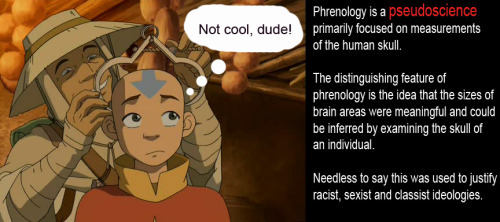
Above image from A:TLA Annotations
There are references beyond Sokka’s flippancy encouraging skepticism of ‘the archive’ as an all powerful body of knowledge. When the gaang meets the Professor, he uses a head measuring device to measure Aang’s head as he interrogates him about air nomad culture. That device, a craniometer, is associated with the debunked and racist scientific concept of phrenology, the study of head shapes as indicative of intelligence and character traits. Race science is as much a part of academia’s history as any wisdom revealed through it. Wan Shi Tong in a similar vein, refers to Katara as “one specimen to add to my collection,” recalling the history of empires and their academics collecting and displaying indigenous bodies for ‘education.’ The show, then, draws a connection between ‘the archive’ and the history of domination. Collection, preservation, documentation--from a certain perspective they all embody attempts to dominate the world through containment. If only I could name it, have the knowledge in my possession, keep it safe under my protection... At worst this looks like Zhao’s use of the library as a means to slaughter the moon and destroy the Northern Water Tribe, while torching all the fire nation archives to protect his own people and power. But Wan Shi Tong’s academic hubris and avarice are another form of domination.
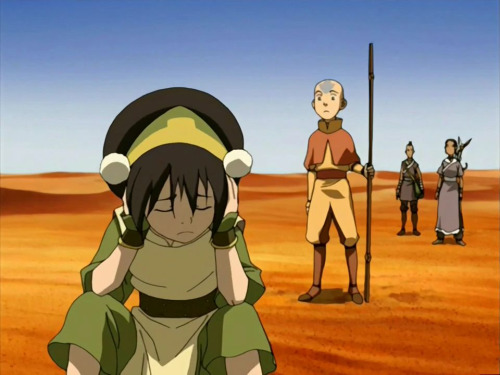
There are pieces beyond the cultures of imperialism. Toph refuses to go in the library out of disinterest, pointing at the failures of visual culture toward the blind. Leaving her and Appa, an animal who similarly has little interest in writing, behind in pursuit of written knowledge has tragic consequences for Aang and his friends. It was only the last episode in which Toph blindfolded Aang to teach him about earthbending and his own persistent inner strength. He abandons it for pre-written answers so quickly now, the way I open up an internet browser as soon as I wonder whether or not my finger tapping is a trauma coping mechanism. Why don’t I trust myself to observe and learn from my own body? Why doesn’t the team trust themselves to face the fire nation? Let’s be clear, it’s not absurd to seek out wisdom and strategy from others past and present. However, it’s only one source of knowledge and so many people, like Aang, Katara, and Sokka, overlook the other forms of knowledge available to them.
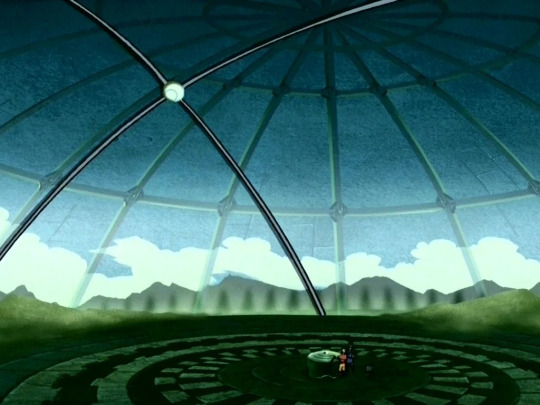
I think its apt that they learn their strategy from merely a scrap of written information (a scrap which Sokka steals using his his hunting dagger made of jawbone, pointing us toward the indigenous perspective he brings to bear on his exploration of the library), which they then interpret through celestial means. The planetarium returns us to the natural and the spiritual world at once despite being within the archive. Tracking eclipses and the movements of astrological bodies has a deep history for humankind (and animal kind!) preceding writing and has been especially important to seafaring people like the Southern Water Tribe (Moana’s “We Know the Way” does a solid job of illustrating these traditions and their blending with oral story traditions). The information they gain from ‘the archive’ is information that was available to them in the world had they observed closely, and perhaps that’s all an archive is.
Still, there are things an archive can’t contain. Impermanence creeps into everything. That can be a deeply sad fact to face. When we see the incinerated Fire Nation archive, we feel for Wan Shi Tong in the same way we cry over the Library of Alexandria’s end. There’s a joyous side to impermanence, though, which is that there is always new transformed things coming into being and giving us more to learn. “That’s called Sokka style--learn it!” Sokka shouts as he whacks Wan Shi Tong on the head with one of his beloved books. Not only does Sokka reveal the book for its material reality as just a plain old heavy and hard object, his line points us to the novelty of his individual self even within all the indigenous traditions Wan Shi Tong claims to have ‘mastered.’ This is the same method Aang gets to discover in the finale, too. Beyond the labels and titles and data, a strange and unique self, a self that’s both free and connected to the people and traditions and values that made us, exists and emanates for a brief and brilliant flash of time.
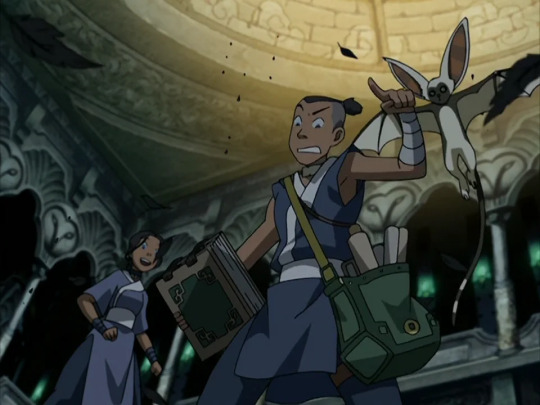
#atla meta#sokka#wan shi tong#aang#katara#braving the elements#aanglove#SWT#colonialism#buddhism#professor zei#imperialism#the world is wide
270 notes
·
View notes
Text
You are the warden. You've been the warden for 7 years now. Recently your prison received an old new inmate. As warden it is your job to rehabilitate him. You crouch down inspecting the scars on his face. But first you have to figure out how he's broken.
“Give me your hand.”
He gives it to you without complaint. His fingers are straight and callused. You know why. You turn his hand over inspecting each scrape and scar. You spare him a glance. He watches you instead of his hand. How easy would it be for you to hurt him.
“Drink this.” You hand him the smoothie. It's thick and too sweet, he shouldn't notice the medicine in it. He drinks it dutifully, handing you the empty cup back.
“Thank you.” You don't like the way he speaks, syllables Inelegantly strung together. A step above a garbled mess. It's unbecoming of him, you'll have to work on that.
You stand up. Time for the fun part. “I will be back.” You turn away, walking towards the platform. Behind you he thuds to the ground. You pause then turn back to him. You take out the craniometer measuring his skull. It’s close to Ardent’s size. They aren’t exact replicas of each other after all. You strip his shirt off measuring his body. Much smaller than Ardent. Bigger than he was in the prison though. You feel his arms, stringy muscles with no padding. You prop him against the wall connecting the electrodes to his head, good thing you shaved him yesterday.
The readings are erratic, nothing like Ardent’s. You smile, a new challenge to bend into shape. You disconnect them and leave the cell. When you come back you’ll claim to have found him laying unconscious in the cell. You’ll be able to run more tests with him awake.
Banging my head against a wall trying to finish a fic i think imma scrap what I've written and start from the top.
4 notes
·
View notes
Photo

"Craniometer" by Ray Ivan Black (facebook.com/rayivanblack)
3 notes
·
View notes
Text
it’s only a matter of time before one of you people chases after Ralf with a craniometer
1 note
·
View note
Text

Craniometer. This instrument was used for measuring the external dimensions of skulls for comparative studies. Craniometry was also used in phrenology, which appeared to determine character, personality traits, and criminality on the basis of the shape of the head.
0 notes
Link
On Friday’s Morning Edition, NPR’s Noel King interviewed Jason Kessler, the organizer of Sunday’s Unite the Right 2 rally in Washington. There were a lot of troubling spots in the soft-focus mess of interview, but perhaps the most stunning was when King asked Kessler what he believes about the differences between races. Kessler proceeded to literally rank various races on the basis of debunked bell-curve myths about intelligence differences between groups on national public media. Spoiler alert: Black people ranked last on the odious list. I almost wondered if Kessler would bring out a craniometer and do a phrenology demonstration in the interview.
Naturally there was a social media backlash after the interview aired, with many people saying that NPR should not have given a platform to Kessler in the first place. In a statement, NPR defended the interview: “Interviewing the people in the news is part of NPR’s mission to inform the American public,” Isabel Lara, NPR’s senior director of media relations, said. “Our job is to present the facts and the voices that provide context on the day’s events, not to protect our audience from views that might offend them,” she continued.
Sorry, NPR didn’t do its job on Friday. When it comes to handling racist and white-supremacist subjects, the job of a responsible media outlet does not end at simply letting figures like Kessler speak unchallenged, in the name of neutrality and balance. It’s not that such people and views should absolutely, under no circumstances, ever be interrogated. Rather, what audiences deserve and have the right to demand is for national platforms to use their space responsibly, which means aggressively countering racist lies and propaganda with facts and truth. Like radioactive material, one-on-one interview formats with white nationalists, if they must be done, should be handled with the most extreme care. (I suggest watching the Guardian’s Gary Younge and how he handled Richard Spencer.)
5 notes
·
View notes
Photo

#ART #SKULL-PTURES> #HediXandt (@HXandt) is a German-born artist that mixes styles and materials with talent. The artist invites the viewer to discover his dark and intense universe with his new macabre artwork. The above pieces are a series that the artist refers to as “skull-ptures”. They combine the aesthetics of naturally shaped bone with state-of-the-art and experimental production techniques. The pieces remind me of the old craniometers that were used to measure the external dimensions of skulls. #DefHot #DefCool #DefAlternative
12 notes
·
View notes
Photo

Exploded #skull for sale! $900 obo. Mounted in a craniometer and able to hang from something. #skullforsale #humanskull #beaucheneskull #vultureculture #explodedskull
1 note
·
View note
Text
geometry (n.)
early 14c., also gemetrie, gemetry, from Old French geometrie (12c., Modern French géométrie), from Latin geometria, from Greek geometria "measurement of earth or land; geometry," from combining form of gē "earth, land" (see Gaia) + -metria "a measuring of" (see -metry). Old English used eorðcræft "earth-craft" as a loan-translation of Latin geometria.
-metry
word-forming element meaning "process of measuring," Middle English -metrie, from French -metrie, from Latin -metria, from Greek -metria "a measuring of," from -metros "measurer of," from metron "measure," from PIE root *me- (2) "to measure."
anthropometry (n.)
"science of the measurement and dimensions of the parts of the human body," 1839, from anthropo- + -metry "a measuring of." Perhaps modeled on French anthropometrie (by 1806).
biometry (n.)
1831, "calculation of life expectancy" (obsolete); see bio- + -metry. Coined by Whewell, popularized 1860s by T.S. Lambert. Later, "application of mathematics to the study of biology" (1894). Related: Biometer, used in various senses from 1830s; from 1865 as "life table," calculating the duration of life under given conditions.
craniometry (n.)
"the measuring of skulls," 1844; see cranio- + -metry. Related: Craniometric; craniometer.
horometry (n.)
"art of the measurement of time," 1560s, from Greek hōra "any time or period" (see hour) + -metry "a measuring of." Related: Horometrical; horometer.
hypsometry (n.)
"the measuring of altitudes," 1560s; see hypso- + -metry "a measuring of."
altitude (n.)
late 14c., "elevation above the horizon" (of stars, planets), from Latin altitudinem (nominative altitudo) "height, altitude," from altus "high," literally "grown tall," from PIE root *al- (2) "to grow, nourish." General sense "space upward, height, vertical extent" is from early 15c. Related: Altitudinal; altitudinous.
psychometry (n.)
1854, "the alleged power possessed by some sensitive persons of reading the history of an object by handling it;" see psycho- + -metry. In reference to the measurement of the duration of mental states from 1879. Related: Psychometric; psychometrical; psychometrist.
stoichiometry (n.)
"science of calculating the quantities of chemical elements involved in chemical reactions," 1807, from German Stöchiometrie (1792), coined by German chemist Jeremias Benjamin Richter (1762-1807) from Greek stoikheion "one of a row; shadow-line of a sundial," in plural "the elements" (from PIE *steigh- "to stride, step, rise") + -metry "a measuring of." Related: Stoichiometric.
gematria (n.)
1680s, from Hebrew gematriya, a transliteration of Greek geometria (see geometry). "[E]xplanation of the sense of a word by substituting for it another word, so that the numerical value of the letters constituting either word is identical" [Klein].
geometrical (adj.)
late 14c., from Latin geometricus "of geometry" (from geometria; see geometry) + -al. Since 16c. it has been opposed to arithmetical in ratio, proportion, etc., reflecting the fact that problems of multiplication formerly were dealt with by geometry, not arithmetic. Related: Geometrically.
optometry (n.)
"measurement of the range of vision; measurement of the visual powers in general," 1886, from optometer (1738), name given to an instrument for testing vision, from opto- "sight," from Greek optos "seen, visible" (from PIE root *okw- "to see") + -metry "a measuring of." Probably influenced by French optométrie.
When I made the foregoing Experiments, I designed to repeat them with more Care and Exactness, and to make some new ones of the same Sort, by means of an Instrument I had contrived for that Purpose; which from its Use in measuring the Limits of distinct Vision, and in determining with great Exactness the Strength and Weakness of Sight, may be called an Optometer. [Dr. William Porterfield, "An Essay Concerning the Motions of our Eyes, Part II," in Medical Essays and Observations, Vol. IV, Edinburgh, 1738]
0 notes

